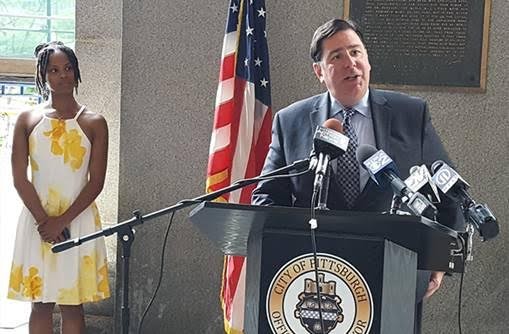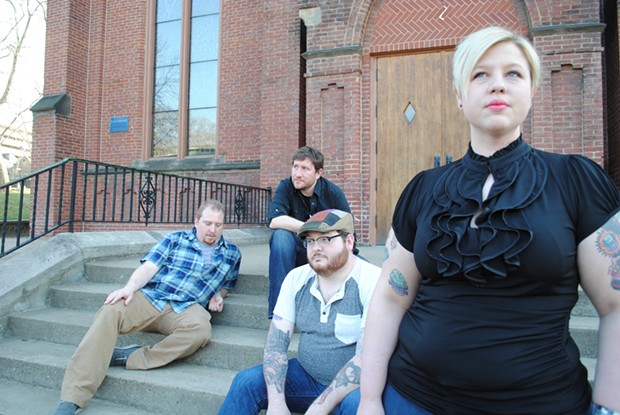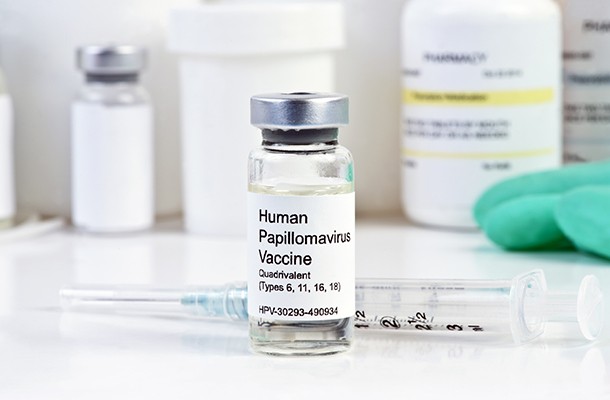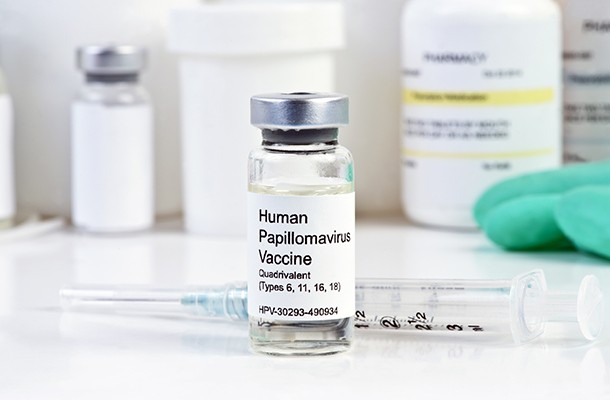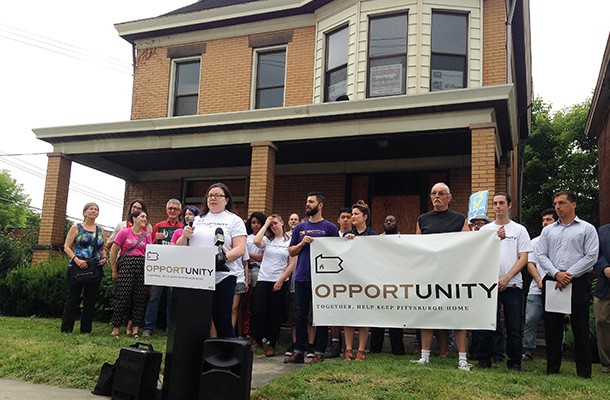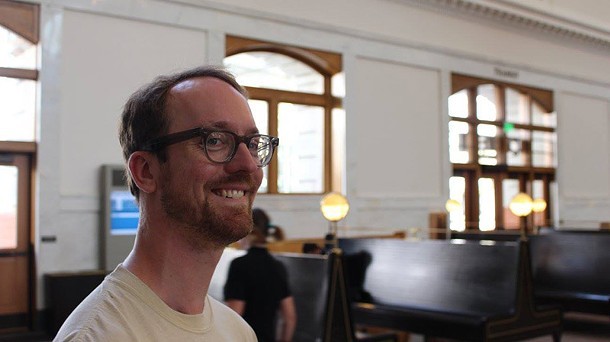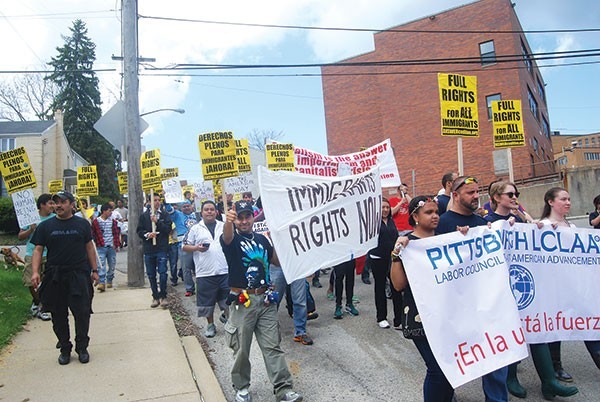Thursday, June 30, 2016
The books explores government policies that have kept Chicago segregated by race. Moore argues that race (rather than class) is the defining factor in inequality and a pervasive feature of life there.
The critically acclaimed book should have resonance nationally, and perhaps especially in Pittsburgh, where segregation is rife and where many say an influx of new development (hello, East Liberty!) has left many longtime residents, in particular African Americans, without affordable housing.
“While mayors Richard M. Daley and Rahm Emanuel have touted Chicago as a ‘world-class city,’ it remains one of the most segregated cities in America,” according to press materials for The South Side. “And while it would be easy to think of a city with a billion-dollar park, Michelin-rated restaurants, waterfront views, world-class shopping, and a thriving theater scene as a model for other metropolitan areas, underneath the shiny façade lurks the horrible reality of deeply-rooted and destructive racial segregation.”
Moore grew up in Chicago’s South Side and is the South Side bureau reporter for WBEZ-FM, Chicago’s NPR station. In the past, she’s worked for Detroit News, St. Paul Pioneer Press and the Associated Press in Jerusalem. Her journalism has also been published in national outlets including Essence and In These Times.
Moore will be at Barnes & Noble for an informal discussion from 7-9 p.m. tomorrow. The event is free.
The store is located at 100 West Bridge St.
Tags: Natalie Moore , The South Side: A Portrait of Chicago and American Segregation , Barnes & Noble , Waterfront , Image
Wednesday, June 29, 2016
It's one of several questions Pittsburgh Mayor Bill Peduto posed at a press conference earlier today on gun violence. Surrounded by local activists and elected officials, Peduto proposed a number of possible solutions for reducing gun violence in the wake of recent mass shootings like the Orlando,Fla., attack earlier this month where 49 were killed.
"In no other situation in this country do 30,000 people die every year of something we can identify and we simply say there's nothing we can do about it," said Peduto. "There are common-sense solutions and small steps we can take to lower that number."
Today's event comes a week after House Democrats in Washington, D.C., staged a sit-in on the House floor to call for a vote on two pieces of gun-reform legislation. One, dubbed, "no fly, no buy" would prevent suspected terrorists on the federal no-fly list from purchasing a firearm. The other would ensure universal background checks on all gun sales, closing a loophole that allows some private sales without a background check.
Last week's sit-in was preceded by a nearly 15-hour filibuster on June 15 spearheaded by Democratic Sen. Chris Murphy of Connecticut in an effort to compel a vote on a "no fly, no buy" measure and expanding background checks. The measures were voted down in the Senate on June 20.
"The ball is in your court now," said U.S. Congressman Mike Doyle, who represents Pittsburgh and participated in the sit-in. "[Your representatives] need to hear from you. If you live in their districts, you need to call them on the phone and say 'we want you to vote; we want a vote on gun control.'"
The event was part of the National Day of Action to Disarm Hate, an effort to maintain the momentum spurred by recent demonstrations at the federal level. But today's speakers also highlighted legislative steps lawmakers can take locally.
In 2008, Pittsburgh City Council passed their own measure to combat instances of gun violence like the most recent local example in Wilkinsburg, where six were killed in April. That measure, the city's lost- and stolen-gun ordinance, would require gun owners to report if their guns are lost or stolen.
It was aimed at straw purchasing: when a person purchases a firearm for someone who is legally prohibited from obtaining one. Under the ordinance, gun owners who do not report their weapons lost or stolen would be fined. But more importantly, advocates of the ordinance say police would be able to track straw purchasers who claim their gun was lost or stolen only after it has been used to commit a crime.
To date, the city says they have not implemented the ordinance under threat of lawsuit, despite promises after it passed to do so. In 2013 while he was running for mayor, Peduto in fact pledged to enforce it. In 2014 the Pennsylvania state legislature passed a law that would allow the National Rifle Association to sue municipalities with gun ordinances like Pittsburgh's.
However, that law was overturned by the Commonwealth Court last year, and last week the Pennsylvania Supreme Court upheld the decision.
"The Supreme Court struck down [the 2014 law] a few days ago," City Council President Bruce Kraus said at today's press conference. "And yet I'm told by CeaseFire PA that action is already mobilizing to reintroduce it in some way, shape or form so our federally elected and state elected [officials] can punish local elected [officials] like my self and like my mayor who are willing to stand up and speak for you and say enough is enough."
The city has not indicated whether they will implement the lost and stolen ordinance now that the 2014 law has been defeated. Kraus did not respond to a request for comment. But according to an article by The Morning Call, Allentown Mayor Ed Pawlowski plans to reinstate his city's ordinance, which was enacted in 2008, the same year Pittsburgh passed theirs.
At today's event, several victims and those impacted by gun violence spoke in an effort to persuade lawmakers to pass gun-reform measures. Among them was Rev. Glenn Grayson, a staunch gun control advocate whose passion for the cause was bolstered when his son Jerron was shot and killed in 2010.
"Today is more than just a photo op. It's a call to action against gun violence," Grayson said. "Our lives will never be the same again because of gun violence. Too many individuals whether mentally ill, or straw purchasers [have access to] an assault weapon that takes lives with a hundred rounds. It makes no sense to you or to me."
Tags: gun violence , gun reform , no fly no buy , background checks , mass shooting , Pittsburgh , lost and stolen , Image
Tags: Pk Delay , Guided by Voices , Weezer , Chet Vincent & The Big Bend , FFW>>
Tuesday, June 28, 2016
"Coal companies and coal utilities have maximized their profits while the cost of using coal-powered electricity has been borne in the lungs, in the hearts, in the minds of our children," Hescox said at a rally Downtown earlier today. "Here in Pennsylvania, I represent over 75,000 pro-life Christians who are pleading for clean-energy reforms."
Today's rally, hosted by the Sierra Club in a conference room of the Courtyard Marriot, coincided with a Bureau of Land Management hearing on the future of the coal industry. BLM is in charge of leasing 570 million acres of publicly owned coal-mining fields.
"There are [hundreds of millions] of acres of public lands nationwide. Every state in the union has them, and every person who is a citizen of the union owns them," said Jim Lyon, vice president for conservation policy for the National Wildlife Federation. "These lands need to be managed and are managed under law for multiple use. That's parks, wildlife, recreation, extractive uses — oil, gas, coal-mining, and grazing. But there isn't supposed to be undue degradation."
According to NWF, 40 percent of annual coal production comes from publicly owned lands. The organization says that leasing public lands for coal production undermines other efforts to combat climate change because the federal government has approved coal leases equal to the amount of carbon pollution from approximately 280 power plants.
In addition to the coal industry's impact on climate change, speakers at the rally also talked about the negative health effects of coal-mining.
"At every stage of the coal life-cycle, there's impacts to human health. The pollution from the burning and the mining of coal and the power plants has even a greater impact on children, [who] are our vulnerable population," said Patrice Tomcik, field organizer for Moms Clean Air Force. "Developing babies and children are vulnerable because they have vital systems that are not mature and are still developing. The lungs and brain actually continue to develop well into the earlier 20s, and exposure to harmful pollution can damage these organs that are very susceptible."
Today's hearing is one of six being held throughout the country as part of BLM's comprehensive review of the federal coal program. According to BLM, the review will consider "whether Americans are receiving a fair return for federal coal, how market conditions affect coal, how federal coal affects the environment, and how these and other factors impact coal-dependent communities."
Tags: coal , bureau of land management , sierra club , climate change , Image
Monday, June 27, 2016
This Monday's MP3 comes from the band LoFi Delphi, who just released its sophomore EP, Always the Quiet Ones. As our writer Mike Shanley puts it, "LoFi Delphi takes a page from its classic pop influences, meticulously arranging the material to sound more like a group song than a riff with some embellishment." Stream or download the song "Goodbye" from the release, and read more about the band here.
Goodbye.mp3
This download link has expired, sorry!
Tags: LoFi Delphi , FFW>> , Image , Audio
Friday, June 24, 2016
The organization boasts a strong track record of revitalization and economic development within participating communities, which would be beneficial for struggling neighborhoods in the Pittsburgh area.
“I live in a loft apartment and I love downtown living,” said Valerie McDonald Roberts, the city's chief urban affairs officer. “I love North Shore living, I love the Strip District living. But you know what? As much as we commend the development within our Downtown and our connecting corridors, that’s not where the masses live.
“The masses live in communities and this conference hits on exactly what the mayor wants to do: It’s to serve the underserved; to reconnect to our communities and to commend communities and one another. In order to build equity and in order to build adequacy within all of our structures — not just the city of Pittsburgh, but the greater Pittsburgh area — we do have to connect the dots. And the one thing in connecting the dots is developing our main streets.”
Pennsylvania’s Main Street program is part of the Keystone Communities program, through the state’s Department of Community and Economic Development. Over 150 communities in Pennsylvania are a part of the Main Street program and 35 of those are accredited by the senate.
Dennis Davin, secretary of the department of community development said that every dollar invested into Main Street communities leverages around $18.
The Main Street chapter focusing on Pittsburgh and Allegheny County has past experience working with sites that are heavily disinvested and distressed. Patrice Frey, executive director of Main Street Center, said the chapter has a good track record of attracting investment to the areas they work in.
“In the last 30 years we’ve seen investment in our Main Street communities north of $65 billion,” said Frey. “We’ve seen over 260,000 buildings — old historic buildings — put back into active reuse in these communities. We’ve seen over 550,000 net new jobs created and we’ve seen over 125,000 net new businesses.”
In the last year in Pennsylvania, in the 47 communities that currently participate in Main Street, over 1,100 new jobs and 139 new businesses were created and 267 rehabilitation projects were started, according to Main Street America.
Tags: revitalization , redevelopment , main streets , Pittsburgh , investment , Image
Human papillomavirus, or HPV, is the most common sexually transmitted disease, according to the Centers for Disease Control and Prevention, which along with the American Academy of Pediatrics recommends the three-dose (over a period of six months) vaccine at that age, meaning before kids generally become sexually active.
More than 25 speakers — including doctors, researchers, executives from health-care foundations, high school students, cancer survivors and even a dentist — addressed Dr. Karen Hacker, head of the Allegheny County Health Department, and council members.
Dr. Liz Miller, director of community health at Children's Hospital at Pittsburgh and a professor of pediatrics at the University of Pittsburgh's School of Medicine, called the vaccine mandate "critically important" for "bridging the gap" in parts of Allegheny County where parents might not be educated on HPV, or where access to primary care is less likely.
"The HPV vaccine is frankly a no-brainer," she said.
According to the CDC, in most cases HPV will go away on its own. But when it doesn't, it can cause genital warts and cancers, including cervical cancer, cancer of the vulva, vagina, penis or anus. Cancer caused by HPV can also manifest itself in the throat, tongue and tonsils.
Currently the vaccine is mandatory for school entry in Rhode Island, Virginia and Washington, D.C.
"We have spoken with all three states to better understand their perspectives and experience," Hacker wrote in an email to City Paper. She says the vaccine is covered by most health-insurance plans and is included in the Affordable Care Act's preventive measures.
John Rhodes, a 50-year-old assistant basketball coach for the Duquesne University Dukes, testified as a throat- and neck-cancer survivor. He called himself a "6-foot-9 walking billboard" for the HPV vaccine. He has been in remission for seven months after being treated for stage-four cancer that settled in his lymph nodes and was caused by HPV.
"My kids are vaccinated," he said. "As a coach and a competitive person, I challenge you [to mandate the vaccine]."
Several doctors shared concern for the pain and complications their patients feel once they are diagnosed with a cancer caused by HPV.
Dr. Umamaheswar Duvvuri, a head- and neck-cancer surgeon at UPMC and the local VA hospital, told the crowd about his 55-year-old male patient from Dubois, Pa., who found a lump on his neck. "I spent the day removing a large portion of this man's tongue," he said. "That could've been prevented."
After the meeting, he explained that he and colleagues will be operating on six patients and treating four others for "oropharyngeal" cancers — head and neck cancers — and that those types of cancers are predicted to rise by 2020.
Sixteen-year-old Sydney Reyes, of Riverview Junior-Senior High School, addressed another common argument against the vaccine — that it will encourage sexual promiscuity in teenagers.
"This assumption can be resolved by having a proper discussion with your teen, not by blocking a vaccination," Reyes said. "Why should we risk a life like this when we really don't have to?"
A few speakers against the vaccine mandate expressed their concerns to the councilors. A parent named Amy Rafferty read a letter from a friend whose daughter allegedly suffered severe hypertonia — muscles spasms — to the point where she couldn't walk anymore after receiving Gardasil, the HPV vaccine from Merck.
James Lyons-Weiler, who formerly worked at the Hillman Cancer Center and who started his own research group entitled the "Institute for Pure and Applied Knowledge," told the crowd he was concerned that the current vaccine would allow for stronger virus strains to attack humans in the future.
Yesterday, Lyons-Weiler posted a 3,000-word essay on his blog denouncing the medical professionals who asked Allegheny County to mandate the vaccine. He also mentioned that he met Rafferty because she organized the local screening of VAXXED — an anti-vaccine documentary that was kicked off the Tribeca Film Festival schedule, and which City Paper's film critic Al Hoff said came "across as an infomercial by way of a conspiracy theory for a discredited argument."
Speakers who followed opponents of the vaccine mandate contradicted their arguments.
Hacker says the comments gathered at the hearing will be presented to the board of health in July.
"They wanted us to consider what the public felt [about an HPV-vaccine mandate]," Hacker said by phone today.
If the board decides to recommend a mandate, a public-comment period would follow.
Editor's note: This post has been udpated to include comments from Dr. Karen Hacker.
Tags: HPV , vaccines , Allegheny County , health , news , Image
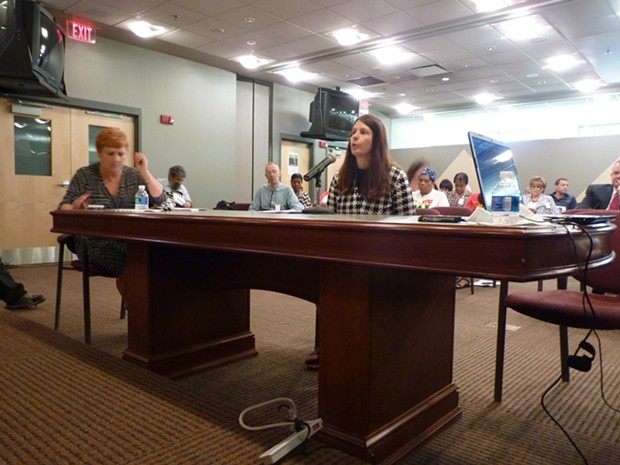
According to a 2016 report from the American Lung Association, the Pittsburgh region failed its criteria for healthy levels of ozone and particle pollution. The region improved on its air quality report from last year, but still has a way to go.
"While air quality in Pittsburgh has improved over the last several decades," says Rachel Filippini, of Group Against Smog and Pollution, or GASP. "We continue to have some of the worst air pollution in the country, especially in terms of fine-particulate matter. One source of these emissions is Port Authority buses."
It is for this reason that a group of environmental and transit advocates spoke at June's Port Authority of Allegheny County board meeting and are calling for the authority to “green their fleet” by 2030, specifically an all-electric fleet.
There are currently 426 diesel vehicles built after 2007, which some would consider “clean diesel,” and 310 diesel vehicles built before 2006, which are not considered clean. PAT board passed a resolution at the meeting that would replace 70 of the older vehicles with newer “clean diesel” options, making the fleet around 70 percent “clean diesel.”
While advocates applaud this effort, they are asking PAT to go even further. Filippini says she would like to see all pre-2006 buses eventually taken out of service and is asking the authority to transition to a fleet of electric buses that are fueled by renewable energy sources. “We must work to green the fleet.”
Kimmy Dihn, of transit-advocate group Pittsburghers for Public Transportation, says moving toward more environmentally friendly vehicles could help address public-health issues, too. “We are voicing the concern of how buses affect the public health of pedestrians, cyclists and public-transportation riders.”
She too is asking PAT to transition to an all-electric fleet. Warwick Powell, of environmental group 350 Pittsburgh, says greening the bus fleet could make Pittsburgh a climate-change leader. He also says this is a great time to do so, given all the local support, including the arrival of solar-energy giant, SolarCity, to the Pittsburgh market.
“Renewable energy has never had stronger support from the government and the public,” says Powell.
PAT spokesperson Jim Ritchie says including electric vehicles is “something we are interested in.” He says the authority is currently working on specifications that will consider including electric buses in the next contract of bus replacements, which could be presented this fall. Ritchie adds that PAT has already tested electric vehicles from companies like California-based Proterra and Canadian-based New Flyer, and plans to test electric buses from one more company. He also notes that the PAT fleet does include 32 hybrid vehicles.
Tags: Port Authority of Allegheny County , climate change , renewable energy , electric bus , air pollution , clean diesel , Pittsburghers for Public Transportation , 350 Pittsburgh , Group Against Smog and Pollution , Image
The work promises to immerse viewers “within images of themselves, literalized by interactive video software via live surveillance feeds from within the gallery,” according to press materials. “The projection mapping functions as an ‘interactive video bath’ constructed from multiple live surveillance feeds mashed together with drone footage, GIS imaging, and poached live webcams from all over the world.”
The purpose is to explore “the crossroads of addiction and demolition.”
Bouscaren is a lecturer in the Department of Art at the University of California Santa Cruz. His work has been exhibited at venues in Barcelona and Madrid, in Spain, and the Museum für Naturkunde, in Berlin.
Tonight’s reception starts are 6:30 p.m. The suggested donation is $10.
Neu Kirche Contemporary Art Center is located at 1000 Madison Ave., on the North Side.
Tags: Tra Bouscaren , Projection Theory Slant Rhyme Institute , video installation art , Neu Kirche Contemporary Art Center , Image
1. Environmental advocates and a local chef hosted a symbolic picnic, demonstrating what foods would be left to eat if the honeybees who pollinate our produce completely disappeared. According to USDA figures, honeybees pollinate $15 billion worth of crops each year, and their colonies are dying at an annual average of 30 percent.
——————————-
2. Ball on the Bridge took over the Andy Warhol Bridge last weekend. The event, which had 28 competition categories, highlighted ball culture and the need for improved health-care services for Pittsburgh’s LGBT community. See our slideshow of the night.
——————————-
3. The Allegheny County Health Department held a hearing this week on whether to add the Human Papillomavirus (HPV) vaccine to its mandatory schedule for boys and girls ages 11 and 12 (in addition to the required tetanus and meningitis vaccines), which is now the Centers for Disease Control's official recommendation. HPV can cause certain cancers, including cervical and throat, among others. The majority of speakers — including pediatricians, gynecologists, researchers and oncologists — spoke in favor of the mandate. Dr. Umamaheswar Duvvuri, a head- and neck-cancer surgeon at UPMC and the local VA hospital, told the crowd, " I unfortunately have to see these patients on the back end of this, when they've already had [cancer caused by HPV]. An ounce of prevention is worth of a pound of cure."
——————————-
4. Affordable-housing advocates are aiming to collect 15,000 signatures to put a referendum to city voters, asking for a 1 percent realty-transfer tax increase to create and fund the Housing Opportunity Fund. The fund is a recommendation of the Affordable Housing Task Force. Advocates say the goal is to raise at least $10 million per year, which would help rehabilitate 270 homes for renters, create 234 new affordable homes, and provide rental assistance to 180 families each year.
——————————-
5. "Venus in Fur" is in its final weekend at Pittsburgh Public Theater. Theater writer Ted Hoover wrote a rave review of the "sly, dark comedy" for City Paper, and arts editor Bill O'Driscoll seconds Hoover, writing this week that "The production is driven by terrific performances ... And then, in its final minutes, the play kicks imperceptibly but decisively into another gear entirely."
——————————-
On our podcast:
This week on the City Paper Podcast, host Alex Gordon sits down with local artist David Bernabo, whom you might recognize from his many appearances in local art, music and dance. Today, David discusses his new(ish) album The Inn and his novel approach to writing and recording. Featuring the album version of "Material," plus acoustic re-renderings of "Winter God Light" and "Table In The Circle."
——————————-
The food scene:
On our Sound Bite podcast, food writer Celine Roberts visits Chillegal, a pop-up kitchen tucked away in a hillside garden in Pittsburgh.
——————————-
On our music blog:
Contributing music writer Meg Fair comments on the inclusive atmosphere that acts Modern Baseball and Joyce Manor create to combat "dude-dominated spaces [that] can feel unsafe and are unfortunately rife with harassment" for women and others across the gender spectrum who attend pop-punk and emo shows.
——————————-
From the pages of our print edition:
Staff writer Ryan Deto writes about Martin Esquivel-Hernandez, who after receiving a driving citation from Mount Lebanon police was picked up by federal Immigration and Customs Enforcement officers on May 2. Esquivel-Hernandez, an undocumented immigrant from Mexico, has been called a community staple and advocate by family, friends and local business-owners. Now, after being moved around for weeks to various detention facilities, he has decided to fight his own deportation.
In his "Pittsburgh Left" column about Esquivel-Hernandez's case, City Paper editor Charlie Deitch writes, "What an oversimplification of a situation based on broken and backward immigration law. They say he’s here illegally. They say he’s not one of us because he’s from Mexico. They couldn’t be more wrong. Martin Esquivel-Hernandez might not be a documented resident of the United States, but he’s a well-documented resident of this city and that has to count for something."
——————————-
This week in City Paper history:
This cover, from our June 19, 2013, issue, is historic because it documents Pittsburgh's final PrideFest held without marriage equality. Here’s hoping this year’s cover was the last PrideFest without discrimination protections for the LGBT community. Read more about this week in City Paper history.
Tags: affordable housing fund , Ball on the Bridge , Chillegal Kitchen , David Bernabo , deportation , HPV vaccine , immigration , Latino , Martin Esquivel-Hernandez , Modern Baseball , news , Pittsburgh , weekly roundup , Image , Video



